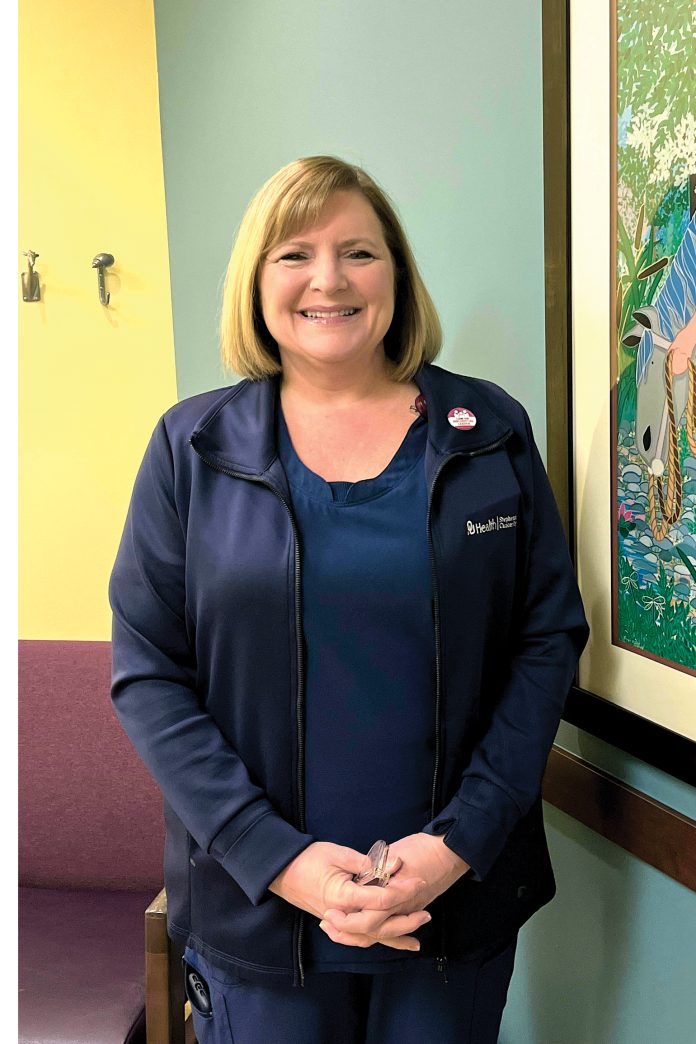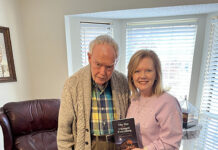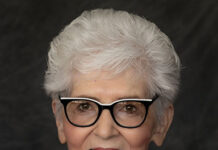
Dee Delgado has served the head and neck population for her 35-year career as a registered nurse. She is the nurse navigator for head and neck patient population at the OU Health Stephenson Cancer Center of the University of Oklahoma Health Sciences.
She advocates for head and neck patients living with cancer by educating them through the course of their health care needs.
Most patients have been diagnosed with cancer before she meets them. She helps patients decrease barriers they might otherwise encounter without her help.
“It’s an opportunity to meet with them and introduce myself and identify with them so they don’t feel like they’re lost and they’re just a number,” Delgado said.
During the 20-30 minutes she spends with a patient, Delgado sees them transition from being highly anxious to feeling more comfortable. Earning the confidence of each patient enriches her life.
“I feel like a cheerleader. I’m trying to encourage them, give them hope, and let them know they’re in a very good place,” Delgado said.
Oral cancer usually causes patients to lose a lot of weight. So, Delgado works closely with a dietician and makes referrals to speech pathology when the issue is throat cancer.
“I’m educating them on their surgeries or chemo and radiation, I’m educating them how the radiation and chemo process works,” she continued.
Delgado explained the importance of making sure head and neck patients have been to their dentist recently. Tooth decay could complicate issues for the jawbone. Patients may also have a compromised airway. Delgado understands the speech of her patients with cancer of the tongue.
“We have a lot of trachs and laryngectomy patients, so I’ve gotten good at reading lips. I can teach you anything about a trach,” she said.
Cancer is not always a death sentence. Many times, her patients may have had a relative or a friend several years ago who had a bad experience.
“I try to educate them that things have really changed in 20 years,” she explained.
For example, OU Health Stephenson Cancer Center is one of two cancer centers in Oklahoma offering proton therapy.
Warning signs of a head or neck malignancy may vary. Early detection is crucial. A lot of times patients will get a little sore in their mouth or on a lip. They sometimes mistake it for small ulcer or canker sore. Elderly patients will recall that their dentures started to not fit right.
She sees a lot of skin cancers, too. OU Health Stephenson Cancer Center will consult with the Dean McGee Eye Institute plastic surgeons when the cancer is near the eye or orbit. They also work closely with endocrinologists when the issue is thyroid cancer.
Her range of observation, communication skills, and curious intellect came with hard work and a concern for the welfare of others. In 1989 Delgado earned her Bachelor of Science degree in Nursing at the University of Central Oklahoma. She has worked at OU Health Stephenson Cancer Center for 10 years and served at OU Health University of Oklahoma Medical Center for 25 years.
“I used to take care of these patients post-op. I worked on a med/surg floor, and I really admired the doctors, and just fell in love with this patient population,” Delgado said.
Experience has developed a network of close relationships among diagnostic professionals. She makes sure all the scans and biopsy slides are received from pathology and radiology so they may be presented at the Tumor Board.
Delgado informs patients of the results of every new scan after the Tumor Board — what the next steps are, and schedules appointments for either surgery, chemotherapy, or radiation. Not every patient lives in Oklahoma City, so at times she will refer patients all over the state.
She does this not by seeing persons living with cancer as objects. Delgado brings her empathetic nature with her to work each morning or when returning home.
“Whenever a stressor pops up in our life — whatever it may be — if you start to feel sorry for yourself, all you have to do is come to work and you say, ‘No, I am blessed,’ because you see what these people are going through. And you’re like, ‘No, I’ve got this.’ It puts it in perspective. It humbles you. You’re just like, ‘Oh, my problems are nothing,’” she said.
Delgado might work a jigsaw puzzle at home after work. It has a calming effect, she said.
“You kind of disconnect and focus on that,” she said. “I like to meditate. I like to go walking or ride my bike. I enjoy being outside. I enjoy God’s creation — you know it’s beautiful.”














